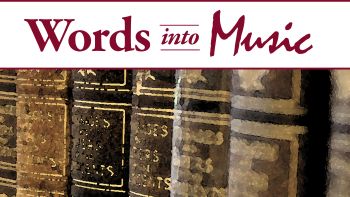Words Into Music 03•03•2024
Program
English Folk Song Suite | by Ralph Vaughn Williams
Ralph Vaughan Williams (1872–1958) was one of the first composers of his generation to travel the English countryside and collect samples of folk songs. He considered himself a musical archaeologist in his efforts to preserve more than 800 of these songs. Vaughan Williams shared this passion with his lifelong friend Gustav Holst. The two men were determined to be “English composers” and offered both detailed criticism and generous support for one another’s work.
Vaughan Williams’s interest in English folk music led him to compose the Folk Song Suite for military band in 1923. The suite originally comprised four movements, with “Sea Songs” as the second movement, but it was adapted to its current form, which has only three movements.
The first movement is a march, “Seventeen Come Sunday.” The first theme is introduced by the woodwinds in an unusual 13-measure line. The second theme, “Pretty Caroline,” is gentle and quiet, and the third theme, “Dives and Lazarus,” juxtaposes a 6/8 rhythm in the upper woodwinds against a 2/4 rhythm in the brass and saxophones. The second movement, the intermezzo, opens and ends quietly with the folk tune “My Bonny Boy.” Midway through the movement, the English waltz “Green Bushes” emerges in a graceful dance. The third movement, another march, is “Folk Songs from Somerset.” It opens with a solo cornet playing “Blow Away the Morning Dew,” which is replaced by the second melody, “High Germany.” The delicate trio features the woodwinds in “Whistle Daughter, Whistle,” and the final tune is the march-like “John Barleycorn.”
Be Thou My Vision | by Travis J. Cross
Travis J. Cross (b. 1977) is an American composer and conductor. He was born in South Korea, but came to Ankeny, Iowa, as an infant. He earned Doctor and Master of Music degrees in conducting from Northwestern University in Evanston, Ill., and a Bachelor of Music degree cum laude in vocal and instrumental music education from St. Olaf College. His principal teachers were Mallory Thompson and Timothy Mahr. Prior to graduate study, he taught for four years at Edina High School, where he conducted two concert bands and oversaw the marching band program. Dr. Cross currently serves as professor of music and director of bands at UCLA, where he conducts the Wind Ensemble and leads the graduate wind conducting program.
“Be Thou My Vision” incorporates a traditional Irish melody found in the 1909 edition of Old Irish Folk Music and Songs. In 1927, the tune was harmonized and matched with the ancient Irish hymn text with which it has come to be so closely associated today.
This arrangement for wind band captures the humble simplicity and deep faith represented by the hymn text. The hymn tune is heard three times in the piece—once with light accompaniment, once with traditional harmonization, and finally in a rich and powerful statement of victory and joy.
Commissioned by the St. Olaf Band, Dr. Timothy Mahr, conductor, “Be Thou My Vision” was premiered on the band’s 1999 winter concert tour with Dr. Cross conducting.
Songs of Abelard | by Norman Dello Joio
Norman Dello Joio (1913–2008) was a classical composer celebrated for his accessible style at a time when modernists dominated American musical institutions. Dello Joio developed his own musical vocabulary which effectively synthesized the aesthetics of Italian opera, liturgical music, and jazz. His compositions are often described as being colorful, carefully crafted, and flamboyant. In 1957 he won a Pulitzer Prize for his “Meditation on Ecclesiastes” for string orchestra and in 1965 an Emmy for the television score “The Louvre.”
“Songs of Abelard” is a symphonic synthesis culled from the music of “Time of Snow,” a dance score choreographed by Martha Graham. Its three movements are the dramatic and tragic expression of the Abelard and Heloise love story. The text for the vocal solo is based on poetic material from the mediaeval period in which the events of this compelling love story took place in Paris. Peter Abelard, a prominent theologian, and his pupil, Heloise, a gifted young woman later renowned as an abbess, exchanged letters following their ill-fated love affair and subsequent monastic lives. These letters reveal the personal and intellectual relationship between Abelard and Heloise and provide an intimate glimpse into the societal context of 12th-century Europe. The letters of Heloise and Abelard will remain one of the great, romantic documents of human civilization while they, themselves, are probably second only to Romeo and Juliet in the fame accrued by tragic lovers.
John David De Haan, Tenor
— Intermission —
The Promise of Living | by Aaron Copland (transcr. K. Singleton)
Aaron Copland (1900–1990) was born in Brooklyn, New York, and began studying piano and writing songs as a young boy. His first piano composition was published in 1920—the same year he entered the American Conservatory at Fontainebleau, near Paris, where he studied composition and orchestration.
Copland returned to New York in 1924 and was determined to earn a living as a full-time composer. In the mid-1930s, he abandoned the Modernist composition style he had adopted in Europe and shifted to a more accessible Populist style—his “Vernacular” style, as he described it. Works composed in this style, which is deemed characteristically American, include those for which Copland is best known, such as Appalachian Spring, Billy the Kid, Rodeo, and “Fanfare for the Common Man.” “The Promise of Living” is from Copland’s 1954 opera The Tender Land, which is an archetypal story about the American heartland. Despite being commissioned by Richard Rodgers and Oscar Hammerstein II and directed by Jerome Robbins, the drama opened to poor reviews and never became established in the American repertoire.
This transcription is by Kenneth Singleton, who is on the music faculty of the University of North Carolina and conductor of the Denver Brass. Singleton is an active guest clinician and conductor and has published more than 50 musical works, mainly for band and wind ensemble.
Lincolnshire Posy | by Percy Grainger (ed. F. Fennell) | Movements 1, 2, 4, 6
ercy Aldridge Grainger (1882–1961) was born in Australia, but he spent much of his early life in Europe and immigrated to the United States as a young man, becoming a citizen in 1918. He scored Lincolnshire Posy for wind band early in 1937. This “bunch of musical wildflowers,” as Grainger described the piece (and hence, the title), is based on folk songs collected by the composer during a trip to the rural county of Lincolnshire, England, in 1905–1906. He recorded the folk songs using a phonograph to preserve the local singers’ renderings of the tunes. Then he crafted each movement as a musical portrait of the person who sang its underlying melody, intending to capture “the singer’s personality no less than of his habits of song.”
Lincolnshire Posy begins with “Lisbon,” a sailor’s song in a brisk meter with definitive spirit and lilt. Movement 2, “Horkstow Grange,” is named for a pleasant farmhouse standing along a country road, but the subtitle—“The Miser and his man: A local Tragedy”—reflects the darker tone of the movement, which is a requiem for an oppressive overseer killed by his distraught worker. Movement 4, “The Brisk Young Sailor,” is a simple tune about a young man who returned to wed his true love. The final movement is “The Lost Lady Found,” a dance song that tells the story of a woman stolen by gypsies. Her uncle is suspected of killing her to acquire her estate, and he is nearly hung for the alleged crime. He is spared and the town rejoices when the woman returns safely, having been found after an extensive search by her sweetheart.
Andrew Richter, Guest Conductor
Give Us This Day | by David Maslanka
David Maslanka (1943–2017) was an American composer who wrote for a variety of genres, including works for choir, wind ensemble, chamber music, and orchestra. He attended the Oberlin Conservatory where he studied composition with Joseph Wood, and spent a year at the Mozarteum in Salzburg, Austria, and studied composition at Michigan State University with H. Owen Reed.
Best known for his wind ensemble compositions, Maslanka published over 150 pieces, including symphonies, concerti, and a full mass. His compositional style is rhythmically intense and complex, highly tonal and melodically oriented. His compositions have been performed throughout the United States, Europe, Australia, Canada, and Japan. Of his nine symphonies, seven are written for wind ensemble, and an additional forty-one works include among them the profound short symphony, “Give Us This Day.”
These notes are from Maslanka: I chose the subtitle “Short Symphony for Wind Ensemble” because the music really isn’t programmatic in nature. It has a full-blown symphonic character, even though there are only two movements. The music of the slower first movement is deeply searching, while that of the highly energized second movement is at times both joyful and sternly sober. The piece ends with a modal setting of the chorale melody Vater Unser in Himmelreich (“Our Father in Heaven”), #110 from the 371 Four-Part Chorales by J. S. Bach.
Program notes by Sue Hinton and Sue Freese


